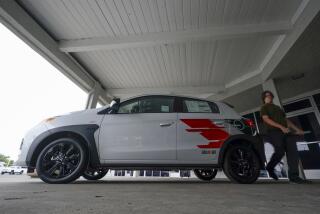Parent’s Debt Load, Declining Budget Spur Cutbacks at Mitsubishi North America
- Share via
Mitsubishi Motors North America, dealing with a shrunken budget and slumping U.S. sales, will have to undergo cuts because of worsening problems at its Japanese parent, Mitsubishi Motors Corp.
Finbarr O’Neill, chief executive of the Cypress-based North American operation, said in an interview that recent marching orders from Tokyo had him considering a wide range of actions, including reductions of the already thin advertising budget and layoffs of corporate staff.
The company employs 1,100 in the U.S., 850 of them in Orange County. Another U.S. division, Mitsubishi Motor Manufacturing in Normal, Ill., with 3,000 employees, probably will also face budget cuts and job losses.
Mitsubishi sales are down by more than 50% in Japan amid a growing scandal about defects that has landed 10 former company officials in jail. The defects weren’t in vehicles sold in the U.S.
What’s more, the parent company is grappling with a $10-billion debt load, mounting losses, plummeting sales in its crucial North American market and a demand from new investors to turn things around.
O’Neill said that when he left Hyundai Motor America to join Mitsubishi’s North American import, distribution and manufacturing arm late last year, “I had a good idea of the company’s challenges in North America.”
“But I didn’t know much about the financial condition of the parent company,” he said, calling the depth of those problems “surprising.”
In Japan, Mitsubishi executives and managers are expected to be asked to accept significant salary cuts, but O’Neill said that wasn’t likely in the U.S.
“It is part of the culture in Japan, a way of apologizing,” he said. “But if we are laying people off and want the rest of the staff to be productive, then we have to attend to their morale. Cutting salaries doesn’t make for happy campers.”
An initial effort to stave off bankruptcy at the parent company failed earlier this year when DaimlerChrysler, which owns 37% of Mitsubishi, refused to increase its investment. In a deal announced late last month, Mitsubishi Motors is to receive $4.3 billion from an investment group including the Mitsubishi group of banking and manufacturing companies, J.P. Morgan Securities and private investment group Phoenix Capital.
Now the new investors “are asking tough questions” and expecting all parts of the company to pare back to the bare essentials, O’Neill said.
“We have to cut our share here,” said O’Neill, who laid off 200 employees shortly after joining Mitsubishi. “But we will do it with the view that we have to succeed and keep growing our business.”
That is seen as good news by Mitsubishi dealers, who have seen business slump dramatically over the last 18 months. Some who have heard O’Neill discuss the company’s U.S. strategy in recent weeks said they were confident things were on the right track.
“Sales are down and obviously I’m not happy about that, but I think the funding that has been infused into Mitsubishi is probably enough to allow us to carry forward,” said Texas dealer Ramsay Gillman, who owns six Mitsubishi dealerships. “The U.S. market is not one that Mitsubishi wants to lose; they’ve got quite a commitment here,” he said.
A former corporate lawyer, O’Neill joined Mitsubishi after leading the team that pulled Hyundai Motor Co.’s U.S. unit out of a tailspin and used a then-unheard-of 10-year warranty program to turn Hyundai into one of the fastest-growing brands in the country.
Dealers said there was no magic bullet for Mitsubishi.
As part of his turnaround plan, O’Neill has cut back on Mitsubishi’s reliance on cheap financing, large incentives and bargain-basement pricing. He believes Mitsubishi must build an image as a brand people want to buy rather than a cheap alternative to cars they’d prefer but cannot afford.
“It is tough when you have to compete directly against Toyota and Honda,” said Jim Speck, owner of a number of Southern California dealerships including Torrance Mitsubishi.
“Mitsubishi never established itself very well as a brand, and now we aren’t giving cars away either,” Speck said. “It might have to be that this company gets smaller before it can get bigger.”
O’Neill was recruited to replace Pierre Gagnon, who was blamed for plunging U.S. sales and massive losses resulting in part from the freewheeling lending policies of Mitsubishi’s North American credit arm.
The lending unit helped move a lot of cars but brought in a lot of marginal customers who eventually defaulted. In all, Mitsubishi has written off about $1 billion in bad loans to customers, most of them in the U.S.
Mitsubishi enjoyed record growth in the U.S. in 2001 and 2002, but sales plummeted last year. The heated incentive wars that lowered auto prices across the board rendered Mitsubishi’s deal-based sales efforts invisible, O’Neill said.
Because the company had been stressing low pricing, consumers no longer had a clear idea of what Mitsubishi’s products were or how they stacked up in the market. Mitsubishi’s U.S. sales fell 26% last year and this year are down an additional 23% through May.
O’Neill says that the message the company needs to get out -- and he winces at the thought of further trims to the ad budget -- is that Mitsubishi cars and trucks are worthy competitors.
He got some help recently from market research firm J.D. Power & Associates, which rated the Mitsubishi Lancer compact and the Endeavor sport utility vehicle among the top models in their respective segments in its 2004 Initial Quality Study.
“We’ve got the product,” O’Neill said. “Now we have to scrape all the nickels off the floor and put them into selling our cars.”






